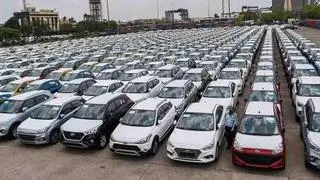The machine tool industry is key to the government’s flagship ‘Make in India’ and ‘Skill India’ initiatives, given that it makes the machines required for the manufacturing sector. V Anbu, Director General of the Indian Machine Tool Manufacturers’ Association (IMTMA), spoke to BusinessLine on the strategic importance of the machine tool industry for the Indian economy, and the manner in which IMTMA is working closely with industry, government, and end-users. Excerpts:
How important are machine tools for industry?
Machine tools are considered a strategic industry segment. It is part and parcel of manufacturing, particularly discreet manufacturing segments such as automobiles, defence, railways, plastic machinery, medical electronics and white goods. Industry cannot achieve a high level of excellence without the machine tools segment being very strong.
Where do the skill gaps exist? And how is IMTMA addressing it?
We are looking at bringing depth to manufacturing which will help the end-user. IMTMA conducts about 150 training programmes all year. Over 35 companies have lent their support to this initiative. Apart from Bengaluru, we also run this programme in Pune and in Gurugram. Broad domains that are covered include productivity, design, maintenance, and automation. Most programmes are on metal cutting. We have deliberately added a few topics on metal forming too. Employees from end-user segments like Bajaj, Ashok Leyland, TVS or companies from defence and aerospace segments actively take part in the training.
How does the global scenario look?
Not all countries are strong in machine tools. Japan and Germany are strong in production and degree of sophistication/technology level. Global production of machine tools is worth around $84 billion. In volume, China leads the pack; in technological maturity, Germany and Japan are at the same level. China’s machine tool production is about $24 billion.
What is the future for machine tools in India?
The Indian machine tool industry will touch $1 billion in 2016. We are looking at getting into high-end manufacturing in sectors like railways, defence and aerospace. Automotive will become bigger, while medical electronics is also expected to grow. All these would require machine tools playing an important role in productivity. There is also the need to deal with larger-sized components and higher accuracy. Imports play a major role in today’s manufacturing technology requirement.
There is a strong correlation between machine tool and manufacturing globally. If you lose your power in machine tool, you lose power in manufacturing technology.
Where does the domestic industry lie currently?
The year 2015-16 has been encouraging for India’s machine tool industry. Production reached about ₹4,750 crore from ₹4,230 crore in 2014-15. Consumption touched about ₹10,300 crore in 2015-16 against ₹9,200 cr in 2014-15. India is the 10th biggest market for machine tools. Of the market size of ₹10,300 crore, domestic production is worth ₹4,500 crore, which is about 42 per cent. India has limited capability when it comes to high-accuracy machine tools. There was no incentive for manufacturers to bring new products to the market, or better-technology products. The other issue is that the sector is SME-driven and there are close to 1,000 companies that produce machine tools.
How does all this bode for Make in India? How do you intend to engage with the government to sort out these issues?
There is a positive sentiment in almost all manufacturing segments, with a direction for people to invest and an opportunity for India to become a manufacturing hub. At the ground level, there is some momentum in sectors like railways, aerospace, and defence. But if we do not grab this opportunity, India might lose 10 years, and by that time everybody would have moved forward.
We need much faster , single-window clearances. We are also looking forward to results on GST, [policy on] land acquisition, and ease of doing business. These are some of the on-the-ground things wherein we need to see results, things which will make ‘Make in India’ truly successful. For the first time, the Department of Heavy Industries has allocated ₹100 crore to kick-start the machine tool segment.
The government must create a financial mechanism to allow Indian companies to acquire firms abroad. Many companies in Germany and other parts of Europe are on the block. Acquiring companies provide access to technology as well as market. We have requested the government to treat this as a national requirement. The government has come up with a Capital Goods Policy and we hope it takes shape and happens through a financing mechanism.
Tell us about the Centre of Excellence in Machine Tools, which has been set up in IIT Madras?
Some individual departments in the IIT are already working with certain machine tool companies. We are also pushing the industry to promote specific projects. Eleven projects have been identified and all have been cleared by the DHI. The total funding initially allocated for these projects is ₹55 crore. Industry is contributing 20 per cent of the project cost.
How is IMTMA helping machine tool companies showcase their technologies and products?
We organise IMTEX, which has become one of the biggest machine tool shows in South-east Asia. Most Indian companies would like to have their own product or product improvements to be showcased at IMTEX, which reinforces our commitment to ‘Make in India’. Most visitors are from the manufacturing domain. Today, the government is playing a more vigorous role and is interested in the end-product. As a sector, we are responsible for productivity improvement in the segment.
What are the main issues being faced by the machine tool industry?
Technology-gap is one major issue. To have an efficient model or mechanism for companies, they need to improve their own technology. Supply-chain is another issue. Payments and taxation and procurement are the other issues.








Comments
Comments have to be in English, and in full sentences. They cannot be abusive or personal. Please abide by our community guidelines for posting your comments.
We have migrated to a new commenting platform. If you are already a registered user of TheHindu Businessline and logged in, you may continue to engage with our articles. If you do not have an account please register and login to post comments. Users can access their older comments by logging into their accounts on Vuukle.